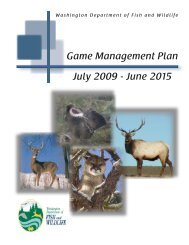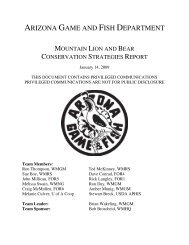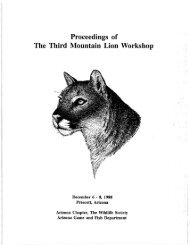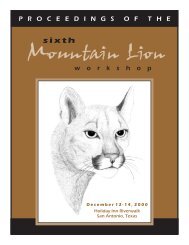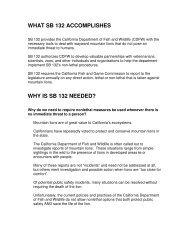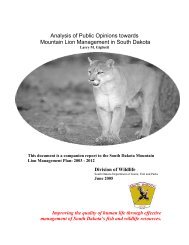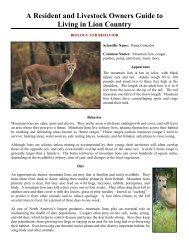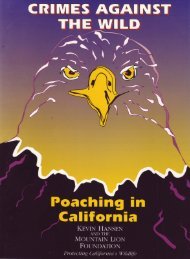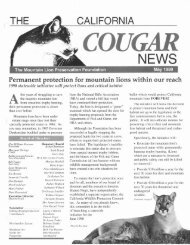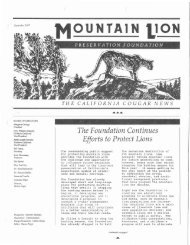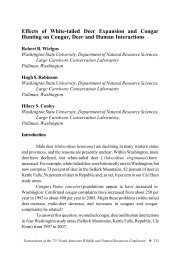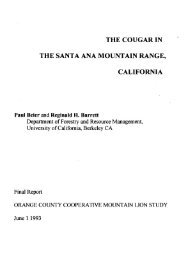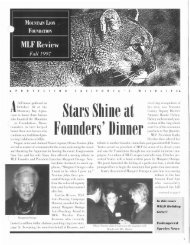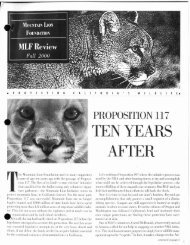Proceedings of the Ninth Mountain Lion Workshop - Carnivore ...
Proceedings of the Ninth Mountain Lion Workshop - Carnivore ...
Proceedings of the Ninth Mountain Lion Workshop - Carnivore ...
Create successful ePaper yourself
Turn your PDF publications into a flip-book with our unique Google optimized e-Paper software.
11) How do we manage real-time GPS data, and do we provide this information to <strong>the</strong><br />
public?<br />
12) (Audience) Are cougars getting less management attention since wolves are<br />
getting, and needing, so much <strong>of</strong> <strong>the</strong> carnivore manager’s time?<br />
Question Response Summary (Main Themes, Concerns, and Responses)<br />
Theme: How can we integrate cougar awareness with current rates <strong>of</strong> urbanization<br />
and loss <strong>of</strong> habitat?<br />
• Concern: Can cougar “danger awareness” be integrated into <strong>the</strong> land-use<br />
planning process?<br />
• Responses: Cougar managers have an ever-increasing responsibility to get<br />
involved in planning activities and to articulate <strong>the</strong> consequences and<br />
educational needs that come about when occupied cougar habitat is converted<br />
to residential and urban areas.<br />
Theme: A need exists for a genetic bank for cougar DNA and disease pathology<br />
having national coverage.<br />
• Concern: Who would manage such a repository?<br />
• Responses: Ei<strong>the</strong>r a University with a well-established genetic lab or a Non-<br />
Governmental Organization (NGO). The Wild Felid Research and<br />
Management Association would be best suited to coordinate a genetic bank.<br />
Samples can be effectively taken using bio-darts, such as in Washington State,<br />
and mandatory check-in <strong>of</strong> hunter-harvested cougars such as those that are<br />
applied in most western states for collection <strong>of</strong> biological samples. Strict<br />
guidelines on data usage and data sharing are needed, or <strong>the</strong>re may be low<br />
willingness to participate for fear <strong>of</strong> unauthorized use <strong>of</strong> data.<br />
Theme: Integrating cougar research with management plans and actions.<br />
• Concern: There is not enough communication between <strong>the</strong> scientific<br />
community doing cutting-edge research and decision making agency<br />
managers and commissioners.<br />
• Responses: Researchers need to stay active and provide <strong>the</strong> latest knowledge<br />
and technology to decision makers like Fish & Game Commissioners and<br />
State Directors/Deputy Directors. The Wild Felid Research and Management<br />
Association were developed to provide a forum to enhance communication<br />
between researchers and managers, as well as a forum for sharing cutting edge<br />
techniques.<br />
Theme: Can current knowledge <strong>of</strong> source-sink dynamics be applied when<br />
establishing cougar harvest guidelines.<br />
• Concern: The current structure for harvest does not adequately consider our<br />
knowledge <strong>of</strong> source-sink dynamics for cougar populations.<br />
• Responses: This knowledge does get applied in some states, for instance in<br />
Wyoming. Better state-to-state communication, and sharing <strong>of</strong> genetic and<br />
o<strong>the</strong>r biological information, will help greatly toward achieving management<br />
<strong>Proceedings</strong> <strong>of</strong> <strong>the</strong> <strong>Ninth</strong> <strong>Mountain</strong> <strong>Lion</strong> <strong>Workshop</strong><br />
197



